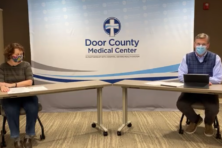County Preps for COVID-19 as Ground Rules Change
- Share
- Tweet
- Pin
- Share
Door County is still considered at low risk for COVID-19, the virus that, through Tuesday, had infected more than 1,000 people and killed 32, mostly in Washington State. That’s eight times the number of infected people reported one week earlier.
Door County schools and medical centers are stepping up preparations and communication to the public in light of local concerns. Door County Medical Center hosted an informational session on Facebook Live on Monday, and officials from the Door County Public Health Department and Door County Medical Center met with superintendents from the four mainland school districts Tuesday to update them on the latest guidance for the virus.
Sevastopol Superintendent Kyle Luedtke said the school is not yet looking at canceling any large events or sending special guidance regarding family travel with spring break approaching in April.
“We’re going to follow what Public Health tells us to do,” Luedtke said. “We’re in contact with Public Health regularly.”
He said some families that have traveled have contacted the school and self-quarantined.
“We hope people use good judgment and take precautions in traveling,” he said. University of Wisconsin-Madison Chancellor Rebecca Blank released a statement advising staff to reconsider nonessential personal or business travel away from Dane County.
“For the next 30 days, UW-Madison is canceling and suspending all upcoming university-sponsored travel to countries severely impacted by the virus,” she said. “This currently includes China, France, Germany, Italy, Iran, Japan, South Korea and Spain. However, the number of impacted countries likely will expand as the disease progresses. This action includes university-sponsored spring break trips.”
Luedtke said Sevastopol has made additional hand sanitizer available, continues to emphasize handwashing and has instructed custodians to wipe down surfaces more frequently.
Though children and healthy young adults have so far proven resilient to the worst symptoms of COVID-19, they can still contract the virus and spread it to more vulnerable populations, which is one reason why colleges and schools in heavily impacted areas have closed.
Gibraltar Superintendent Tina Van Meer said the district will send a letter to parents later this week asking them to follow the Wisconsin Department of Health Services’ recommendations regarding travel during spring break. Those recommendations advise that anyone traveling to countries with a CDC Level 3 travel health notice must follow a limited self-quarantine for 14 days after returning to Wisconsin.
“We will also remind parents of the signs and symptoms to look for with COVID-19 and encourage parents to keep children home when they are sick,” Van Meer said.
The district will complete more deep cleaning of the building during spring break, with special attention to door handles, railings and other areas with high traffic.
At Door County Medical Center, two patients have been tested for the virus. Both were suspected because of travel to affected countries, and both came back negative.
During a Facebook Live session, Dr. Jim Heise, chief medical officer of DCMC; and Susan Powers, public health manager/health officer of Door County Health and Human Services, discussed the latest updates on COVID-19.
“The risk remains low, but seasonal illnesses are peaking right now,” Powers said.
Though the peninsula is relatively isolated and no cases have been reported here, Heise and Powers urged people not to become complacent in taking precautions.
“The reality is [that] we live in a global community,” Powers said. “We’re working with state and national experts to continue monitoring this.”
Heise said that just two places in the state handle COVID-19 testing: the Wisconsin State Laboratory of Hygiene in Madison, and the Milwaukee Health Department. Hospital staff take a swab of patients, send it to one of those labs and get results within 24 to 36 hours. During the intervening period, the patient is quarantined.
“Whenever there is a suspected case, we alert Public Health immediately,” Heise said.
Heise urges visitors to the hospital to continue following the advice for handwashing that they would follow throughout the year.
“At this point, we don’t have any specific limitations on visitors,” he said. “In Green Bay, with influenza outbreak, some hospitals have had limited visitation this year.”
The medical center is prepared to alter cleaning protocols slightly in light of the virus’s characteristics.
“What we know is, the virus can sit on surfaces longer,” he said. “So [a] room is cleaned thoroughly, and [we] let the room sit for two hours.”
The general criteria for testing patients for COVID-19 are travel to an affected area and/or contact with a person infected with the virus or symptoms of the virus.
“Fever, cough, respiratory issues, and some people have had diarrhea,” Heise said. “It can come across like the common cold. The time from exposure to a positive test is generally five days. The time from exposure to symptoms is about 11 days.”
Evidence so far shows that 80 percent of those infected will have a mild, self-limiting illness. Heise said one reason not to do blanket testing of anyone with symptoms is that a positive test “doesn’t change how we would treat you because there are no specific treatments for COVID-19. We would treat you much like if you had the flu or other respiratory illness. The testing is good to tell us whether the virus has spread.”
In a press release, Door County Medical Center explained that the virus is spread in the same way as many seasonal viruses such as the flu. Precautions include:
• Staying home when you’re sick, except to get medical care.
• Avoiding close contact with people who are sick.
• Washing your hands often with soap and water for at least 20 seconds. If soap and water are not available, use hand sanitizer. Look for one that’s 60 percent or higher alcohol-based.
• Coughing and sneezing into a tissue (make sure to throw it away after each use!), or coughing and sneezing into your arm or elbow, not your hands. Teach kids to do the same.
• Cleaning and disinfecting your home as usual with regular household disinfectants. Pay special attention to frequently touched surfaces such as doorknobs, countertops, tabletops and handrails.
A Scandia Village Good Samaritan in Sister Bay new restrictions on visitors went into place Wednesday. Administrator Michelle Notz said the facility is barring all non-essential visits to the campus.
“It will be determined on a case-by-case basis,” she said. “We don’t want to restrict family in an end-of-life situation or other very specific things.”
Visitors will be screened, wash hands, and given protective equipment to wear. Those with potential exposure to COVID-19 through travel or contact will not be allowed into the facility.
At Sister Bay’s Hometown Pharmacy, customers are depleting the store of hand sanitizers and masks.
“We can’t get any masks or hand sanitizer in our pharmacy right now,” said Paul Fritschka, a retired pharmacist who fills in at the pharmacy as needed.
“I’ve been doing this for a long time, but I’ve never seen the interest people have in it now,” he said. “People should be aware of what’s going on and what the ramifications are.”
He said people are asking whether they can or should stock up on medication, but he said most insurance plans allow for only a 30-day supply. Customers have also asked him whether there will be any shortages of medication. At this point, Fritschka isn’t seeing that, but, he said, “All those types of things we really don’t have any answers on at this time. But stockpiling isn’t the way to go.”
At Northern Door Children’s Center, the staff is following the story just as everyone else is, encouraging frequent handwashing, cleaning and not touching your face.
The Environmental Protection Agency (EPA) released a list of registered disinfectant products qualified for use against COVID-19 through the agency’s Emerging Viral Pathogen Program. This program allows product manufacturers to provide the EPA with data, even in advance of an outbreak, that show their products are effective against harder-to-kill viruses than SARS-CoV-2.
The U.S. Department of Health and Human Services announced last week that it intends to purchase 500 million N95 respirators for the Strategic National Stockpile during the next 18 months.




